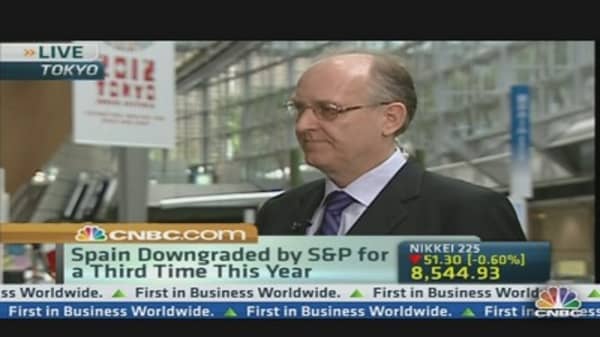Standard & Poor’s decision to cut Spain’s credit rating to one notch above junk status is weighing on markets, but analysts see a silver lining here — it could push a reluctant Madrid into asking for a bailout and thus alleviate pressure on its borrowing costs.
“Spain has been dragging its feet and the potential positive outcome from the S&P downgrade is that Spain could come to the table faster because markets are likely to put pressure on the bond market again,” said Ray Attrill, global co-head of foreign exchange strategy at National Australia Bank in Sydney.
S&P cut Spain’s sovereign credit rating for a third time this year, moving the long-term rating to BBB-minus with a negative outlook, citing a deepening recession that limits Spain’s options to bring its economy back on track.
The news that came out late on Wednesday knocked the euro , which fell to its lowest level since Oct. 1, and was expected to put pressure on Spanish bond prices when European markets open later on Thursday.
Both S&P and rival ratings agency Moody’s now have Spain’s ratings one notch away from junk status, a level that would imply an increased possibility of a debt default and prompt investors to ask for a higher rate of interest for holding risky Spanish bonds.
Moody’s is expected to come up with its latest update on Spanish ratings sometime this month.
“It does look like a game is going on between Spain and perhaps the European Central Bank and the Brussels policy regime. I think that these things will play out over time,” Paul Sheard, chief global economist at S&P Ratings Services, told CNBC from the sidelines of the International Monetary Fund’s semi-annual meeting in Tokyo. (Read More: Spain Finance Minister ‘No Bailout’ Remark Sparks Laughter.)
All Eyes on Moody’s
“Moody’s may be waiting to see if Spain goes for help and if nothing happens, then we could see a downgrade,” said Attrill.
Kathy Lien, managing director for foreign-exchange strategy at BK Asset Management, said Moody’s has been reluctant to report on Spain because it does not want to be responsible for forcing Madrid into accepting a bailout, which would be inevitable if the rating is cut to junk status.
“Spain has been holding onto its investment grade rating by a very thin thread and (the S&P) announcement will push Moody's to make a decision soon,” she said in a note. “It also pressures the Spanish government to ask for bailout because 10-year Spanish bond yields will most likely tick higher when they open (on Thursday),” she said in a note.
Spain’s economy is in recession, unemployment is near 25 percent, and with tax revenues falling, the government has struggled to get its budget deficit down. (Read More: Spain's Troubles Worsen, Spark New Phase for Euro Crisis.)
Spanish yields, which surged above 7 percent in July to unsustainable levels, have steadily fallen as steps taken by the ECB and euro zone policymakers calmed jittery markets.
Analysts expected the euro, which fell to a low of $1.2824 on Thursday, to remain under pressure.
"If we get Moody’s downgrading Spain’s bonds to junk status… that could have a strong psychological effect and take the euro below the $1.28 mark, which has proved to be a strong price support in the past few sessions,” David Rodriguez, quantitative strategist at DailyFX in New York told CNBC Asia’s “Squawk Box.”
A Moody’s downgrade could also see the calm in markets that the ECB has strived to achieve in recent months ebb away, analysts said.
“If Moody’s downgrade Spain to junk status that could cause some panic and some re-think of the Spanish situation,” Kelvin Tay, regional chief investment officer, southern APAC, UBS Wealth Management, told CNBC.
—By CNBC’s Dhara Ranasinghe; Follow Her on Twitter @DharaCNBC




